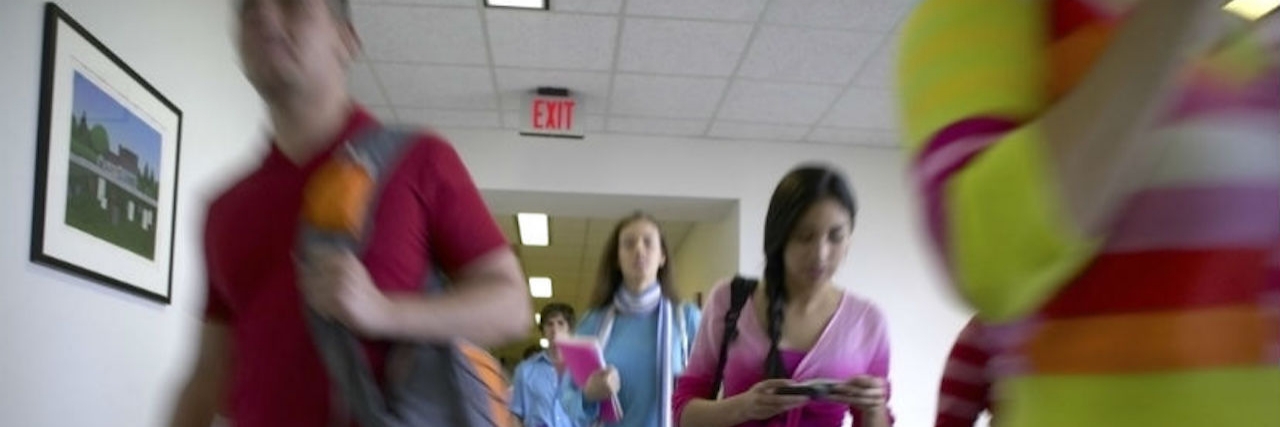For some people, the high school experience is defined by sports games, high school boyfriends, friends and parties. Or maybe that’s just a misjudgment I’ve made based on high school movies. I still think even the snarkiest people have some faint optimism their high school lives will be like “Ferris Bueller’s Day Off” or “10 Things I Hate About You.” Heck, I wouldn’t have minded if it was “High School Musical.”
For me though, a person who’s had health issues affecting nearly every body system since I was 13, high school was defined by medical situations. It was blood tests before school and after-school doctors’ appointments. While some people missed a week of school to go away to a sports camp or a music event, I was in the hospital, catching up on work in a stiff bed and asking the night shift nurses to explain a biology concept while they did observations. When I was in classes, I struggled. Grade-wise, I was on top of the world. I could have gotten into an occupational therapy course in my country. However, it wasn’t hard to miss that I was dizzy; walking a few extra meters could mean passing out. Some days I was nauseous and didn’t eat much. One time, I remember being self-conscious to wear a bikini because of the black and purple bruise marks all over my ribs, collarbone and legs.
However, I graduated. I finished my exams. My school uniform was discarded. I was onto the next stage of life. But what is the next stage of life when you struggled through the previous one? For me, a top student and a “Type A” person, the next step was university. I packed up my suitcases, and my dad dropped me off in a place where I didn’t know anyone, at a university I didn’t know much about. However, it was the course I wanted to take.
Before I moved and before graduation, people who had known me for years asked where I would be living. I said my grandma’s house. However, when I moved out with scholarship money that could cover my rent, I decided I could be my own woman: cook my food, vacuum my carpet, sleep whenever I wanted. Hadn’t I outgrown the chronic illness thing?
In retrospect, I think the issue was that I associated being ill with a place. The concrete stairs I had fainted on at school, where they had to call an ambulance because I hit my head. How I always got dizzy on the long walk from biology to English. How every Friday I would go home on the bus, walk into my house and fall asleep, not waking up until mid-Sunday morning.
Then there were memories associated with chronic illness being a time in my life. I could mistakenly think it was something like puberty — something with an end date that I would outgrow. For example, when I got my period, I got so dizzy I almost fainted. When the first guy I really liked told me he found someone else, I was waiting to be admitted for two weeks of inpatient rehabilitation. Chronic illness, high school and growing up were all intangible concepts.
It took me a solid year to remember what chronic illness was like, and it was a year and a half before I dropped out. I tried too hard until one day, I wheeled into the student guild in a wheelchair, and my friends (who I had never mentioned health problems to) wondered where I had attained such an object. The hardest thing was realizing some of the reason I crashed was my own fault: the alcohol I drank even though I shouldn’t have, the awkward meal times with clumsily arranged food, the weird sleeping schedules. After I realized that though, I could pick myself back up. I realized I had done well managing my health as a teenager, and I could do the same as an adult.
Now, I no longer do occupational therapy but have re-enrolled in law school and am excited for what being a not-so-healthy university law student can bring.
The Mighty is asking the following: Share with us an unexpected moment with a teacher, parent or student during your (or your loved one’s) school year. If you’d like to participate, please send a blog post to community@themighty.com. Please include a photo for the piece, a photo of yourself and 1-2 sentence bio. Check out our Submit A Story page for more about our submission guidelines.
Lead photo source: Thinkstock Images

